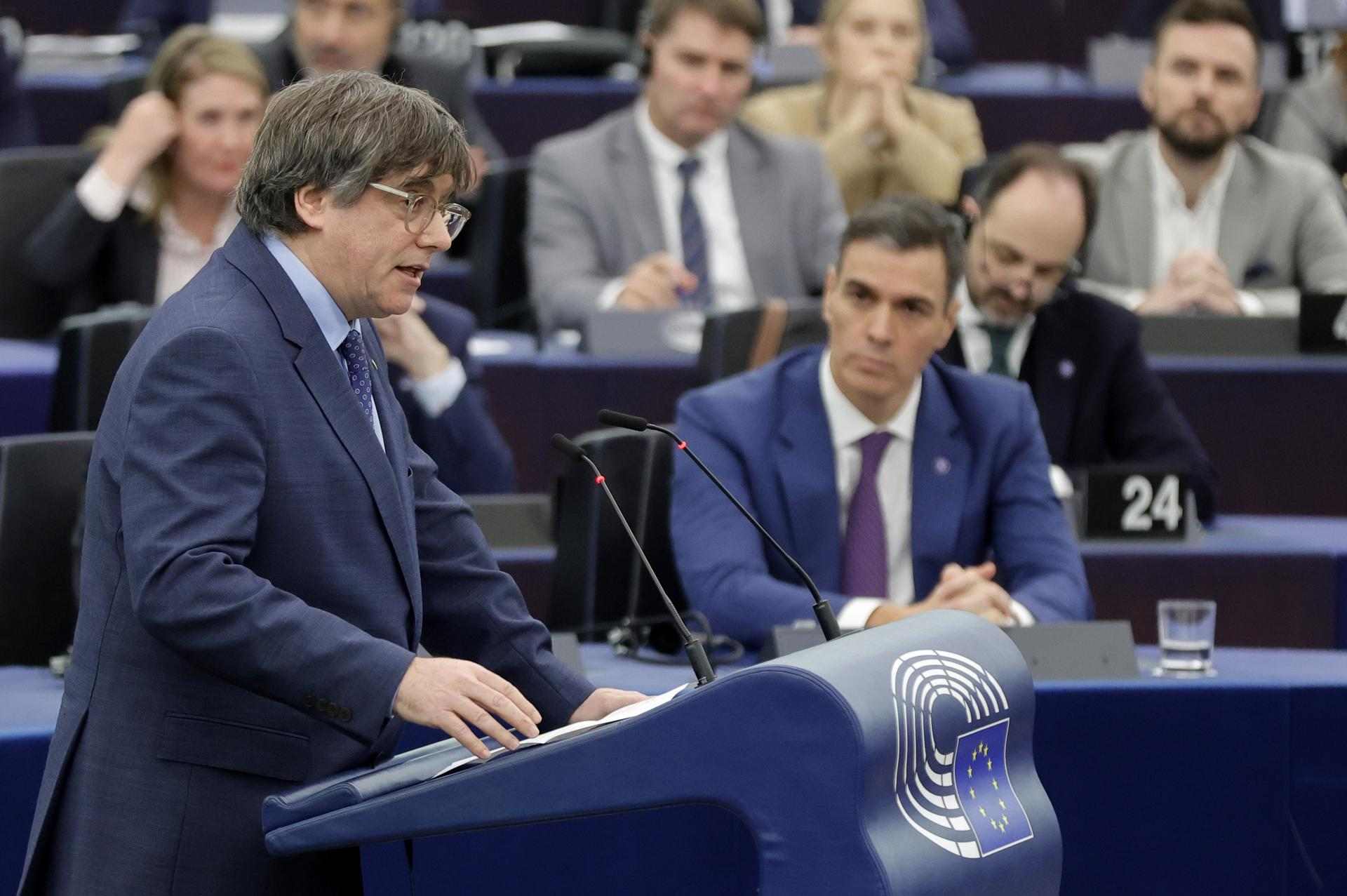A rebellion among Spanish public prosecutors. In a decision made by a large majority, 12 out of the 15 prosecutors who make up the criminal board of the Supreme Court prosecutors' office have agreed to reject the report prepared by their colleague Álvaro Redondo, which argues that there is no evidence that places the actions attributed to the Tsunami Democratic protest platform within the definition of terrorism, and that similarly, there are no actions for which former Catalan president Carles Puigdemont can be accused in the investigation, as announced this Tuesday by the office of Spain's chief prosecutor (FGE).
The reporting prosecutor discarded these two points, but the majority of his colleagues have overridden him. In principle, this result requires a new prosecution report to be drafted which will call for Puigdemont to be arraigned with terrorism charges in the Tsunami case. However, as the FGE spokesperson clarified, since the two prosecutors who preside over the board are at variance with the majority view, it will be their hierarchical superior, the lieutenant prosecutor of the Supreme Court and number 2 prosecutor in Spain, María de los Ángeles Sánchez Conde, who will decide whether a new report should be made or not.
The result of the vote shows that a large part of the members of the public prosecution service - dominated by the conservative Prosecutors Association - has also openly taken sides against the independence process amnesty law, the key legislation which the Pedro Sánchez government is promoting. The vote also marks a new challenge against Spain's chief prosecutor, Álvaro García Ortíz, and 19 of the 30 prosecutors attached to the Supreme Court have already demanded that he defend them against the criticism made by Catalan pro-independence politicians, such as Junts.
The Supreme Court is to decide
However, the decision of the prosecutors' board is not binding for the Supreme Court, presided over by judge Manuel Marchena, which will have to decide for itself whether or not to back the thesis of judge Manuel García-Castellón, who maintains that there are sufficient grounds to maintain the investigation for terrorism, and to include the Catalan president in the case, for the major public mobilizations against the sentence in the pro-independence leaders' trial, in the autumn of 2019. The judge Juan Ramón Berdugo - who was also part of the court that convicted the Catalan leaders for sedition - is the judge who has to draft the position of the Spanish high court. His text is key, because if he upholds Puigdemont's accusation in the case, it is another obstacle in the path of the former Catalan president receiving an amnesty.
Prosecutors embroiled in controversy
The position taken by the prosecutors has been under very close observation since this Monday, when the chief Spanish prosecutor, Álvaro García Ortiz, had to publically deny that he had pressured the prosecutor Álvaro Redondo (of the conservative Association of Prosecutors) to change his report on the Tsunami case, and that, in fact, Redondo maintained the same criteria as the prosecutor of the National Audience, Miguel Ángel Carballo, taking harshly critical views of judge García-Castellón for elevating the Tsunami case to the Supreme Court without any evidence against the two parliamentarians accused, whose presence on the list of accused is, furthermore, the only reason why the high court would have to hear the case.
That is, with these two political representatives among the accused - MEP Puigdemont (Junts) and Catalan MP Ruben Wagensberg (ERC), the second of whom confirmed last week that he moved his residence to Switzerland due to his fear of being arrested, the whole group of 12 - which also includes the general secretary of ERC, Marta Rovira, and nine others - had to be sent to the Supreme Court, if there was evidence to pursue the case. The overridden opinion by Redondo had argued that there was not, while also stating that he had not "received any instructions, nor any suggestions from the chief prosecutor", in relation to the Tsunami report.
The Prosecution Service is hierarchical - although a prosecutor can express in writing that he disagrees with the opinion of his superiors if this is the case - as provided for in Article 27 of the statute governing the prosecutors. In the Tsunami case, the controversy was caused by the dissemination of a first draft by prosecutor Redondo, in which he allegedly argued to maintain the case against Puigdemont before later, going back on this.
Chief prosecutor in Barcelona
Despite the high tension in the meeting of the Supreme Court board of criminal prosecutors, the Chief Prosecutor of the state, Álvaro García Ortiz, is maintaining his agenda and this Wednesday will chair a meeting with the chief prosecutors of Barcelona, Tarragona, Lleida and Girona, in Barcelona's City of Justice court complex. Before that, he will interview Catalonia's top prosecutor, Francisco Bañeres. One of García Ortiz's most recent requests to all prosecutor's offices in Catalonia was for them to inform him of the cases that could fall under the amnesty law.
Composition of the board
The board of the criminal section of the Supreme Court prosecutors, which met at 10am this Tuesday, is chaired by Fidel Cadena - one of the prosecutors in the pro-independence leaders' trial who maintained the indictment for rebellion until the endof the hearing - and Joaquín Sánchez-Covisa, appointed chief prosecutor of the criminal division of the Spanish high court in May 2022. Also on the board are two other prosecutors from the leaders' trial Javier Zaragoza and Consuelo Madrigal, who maintain their belligerent position against Catalan independentism. The other prosecutors on the board are: Consuelo Fidalgo, Juan Carlos López Coig, Manuel Martínez, María Ángeles Garrido, José Martínez Jiménez, Salvador Viada, Olga Sánchez, Justino Zapatero, Manuel Dolz, and Álvaro Redondo - who has argued in favour of the Tsunami report.

